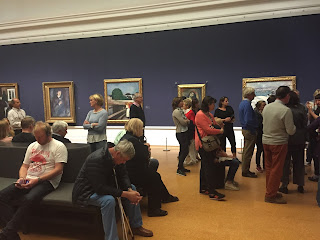Fiction
My efforts to write fiction have produced some interesting beginnings. I've thought of collecting them, because each points to a world that might yet unfold. One draws on the diary and papers of an overseas Chinese from Vietnam who ends up in the suburbs of New York City. He's "Mad Men" vintage, like my father. Another is placed in the 2600s - the Berkeley of the 2600s, which I foresee as an outpost of the global matriarchy, not without its enemies. Another is set in Christiana, as Oslo was known, in the early 20th century. A fourth charts two characters from medieval Japan who travel through time, changing sex but maintaining a complicated relationship.
Fiction is a different animal than whatever it is I write more readily. (Figuring that out is a question in itself, but "short, polemical or ruminative essays" best describes my path of least resistance.) Oddly, the beginnings of fiction come quickly, but then I'm unsure where to go next. I can picture the world visually, which is a clue perhaps that I should proceed "as in film." (Someone once described my poems as "filmic.")
Poems are the other thing I write fairly readily, especially when I keep to a form, like sonnets. I used to write poems only when they appeared, but poetic structure prompts them, I find.
The "pic-collage" below, as the artist Karen LeGault called others like it, is something new, the result of "sketching" on the iPad on which I'm writing this. The iPad has a bit of the quality of my old Olivetti - less formal than even a laptop. (Usually I write a text separately and then put it into the blog "machinery," but today, I'm writing this firsthand, using the Blogger app.) When I finished this three-tower image, it reminded me of "Embassytown," a science-fiction novel by China Mieville that I read recently - the first science fiction I'd read in decades. The book pulled me in, but it bogs down when the action lands in the city itself, an outpost of empire, and shifts gears, laboring to make certain points about language that Mieville must have found interesting. That bogging down is the problem with fiction. It's partly the apparent need to fill the requisite space.
The writers I admire, like Robert Musil and Witold Gombrowicz (among current ones I'm reading), build up their great works from remarkable parts that cohere memorably as one reads. I pick them up and put them down, the reading of them stretching out over years, like a friendship that's mercifully unbounded by time and space.
Fiction is a different animal than whatever it is I write more readily. (Figuring that out is a question in itself, but "short, polemical or ruminative essays" best describes my path of least resistance.) Oddly, the beginnings of fiction come quickly, but then I'm unsure where to go next. I can picture the world visually, which is a clue perhaps that I should proceed "as in film." (Someone once described my poems as "filmic.")
Poems are the other thing I write fairly readily, especially when I keep to a form, like sonnets. I used to write poems only when they appeared, but poetic structure prompts them, I find.
The "pic-collage" below, as the artist Karen LeGault called others like it, is something new, the result of "sketching" on the iPad on which I'm writing this. The iPad has a bit of the quality of my old Olivetti - less formal than even a laptop. (Usually I write a text separately and then put it into the blog "machinery," but today, I'm writing this firsthand, using the Blogger app.) When I finished this three-tower image, it reminded me of "Embassytown," a science-fiction novel by China Mieville that I read recently - the first science fiction I'd read in decades. The book pulled me in, but it bogs down when the action lands in the city itself, an outpost of empire, and shifts gears, laboring to make certain points about language that Mieville must have found interesting. That bogging down is the problem with fiction. It's partly the apparent need to fill the requisite space.
The writers I admire, like Robert Musil and Witold Gombrowicz (among current ones I'm reading), build up their great works from remarkable parts that cohere memorably as one reads. I pick them up and put them down, the reading of them stretching out over years, like a friendship that's mercifully unbounded by time and space.



Comments
Post a Comment